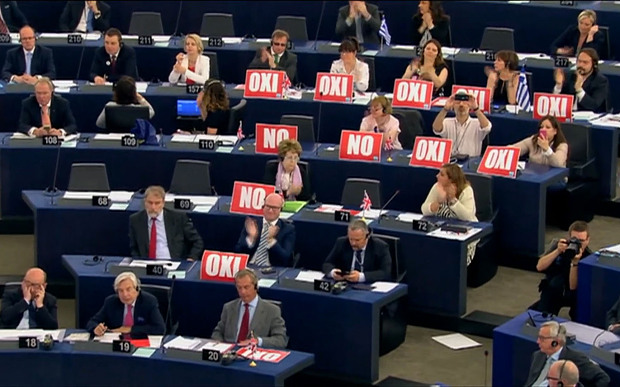-
Tips for becoming a good boxer - November 6, 2020
-
7 expert tips for making your hens night a memorable one - November 6, 2020
-
5 reasons to host your Christmas party on a cruise boat - November 6, 2020
-
What to do when you’re charged with a crime - November 6, 2020
-
Should you get one or multiple dogs? Here’s all you need to know - November 3, 2020
-
A Guide: How to Build Your Very Own Magic Mirror - February 14, 2019
-
Our Top Inspirational Baseball Stars - November 24, 2018
-
Five Tech Tools That Will Help You Turn Your Blog into a Business - November 24, 2018
-
How to Indulge on Vacation without Expanding Your Waist - November 9, 2018
-
5 Strategies for Businesses to Appeal to Today’s Increasingly Mobile-Crazed Customers - November 9, 2018
Greece turned up empty-handed to emergency bailout talks
The European Union is expected to decide Sunday whether to grant another bailout program, once it receives more details about Greece’s economic plans.
Advertisement
REUTERS/Yves HermanGreek Prime Minister Alexis Tsipras (L), Italian Prime Minister Matteo Renzi (C) and German Chancellor Angela Merkel attend a European Union leaders summit in Brussels, Belgium, June 25, 2015.
Greece’s leaders have until Sunday to come up with a plan to pay back their creditors and begin the process of rescuing the country’s economy from bankruptcy and extending a lifeline to the nation’s weakened banking sector.
James Nixon, chief European economist at Oxford Economics, said there’s “a narrow trajectory from here that sees an emboldened Greek parliament accepting the need for reform in return for a debt write-down”.
A Greek government official, who asked not to be named because of the sensitive nature of the discussions, said Tsipras was presenting a “common ground” to the 18 other leaders Tuesday, while a detailed proposal would come Wednesday.
Greek Prime Minister Alexis Tsipras earned both cheers and jeers as he told lawmakers at the European Parliament that his country is seeking a deal that will mean a definitive end to his country’s financial crisis, not just a temporary stop-gap. “It’s not a matter of weeks but of a few days”.
“Debt relief is the most delicate issues for the majority of countries”, said Slovak finance minister Peter Kazimir.
Jeroen Dijsselbloem, president of euro zone finance ministers, said it was “too early to say” whether the Greek plans were substantive enough to reopen formal talks.
The upcoming talks follow Tsipras’ bigger-than-expected win in Sunday’s bailout referendum, when 61 percent of Greek voters rejected measures creditors had proposed last week in exchange for loans.
If a reform list was adequate and Greece took a few prior actions to enact first measures, Ms Merkel said she was sure that short-term finance could be provided to help Athens over its immediate funding needs.
In Washington, the White House said President Barack Obama talked with Tsipras by phone Tuesday.
Speaking in Brussels on Tuesday, he said the Greek government “continues its efforts with the people’s mandate as a weapon, and its desire for a viable agreement that brings an end to this story and guarantees an exit from the crisis”.
The EU’s Economic Affairs Commissioner Pierre Moscovici said an agreement with Greece was possible but it was up to its government to make credible proposals to its fellow eurozone members.
If he does, bridge financing could be provided by “Greece’s friends” and by releasing past European Central Bank profits on Greek bonds, to prevent Athens from missing a crucial €3.5 billion bond redemption to the European Central Bank on July 20th, the sources said.
Anxiety is building over the possibility that Greece could be forced out of the eurozone – a seismic shock not only for Europe but also for the world economy. We have a scenario as far as humanitarian aid is concerned.
Advertisement
Greece’s banks have been shut since its most recent worldwide bailout programme expired last Tuesday while capital controls have been imposed, limiting withdrawals to 60 euros a day. But it said Greece had to provide more collateral, a move that will make it more difficult to access the vital funds in the future.





























